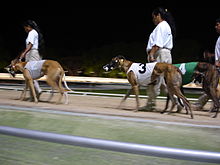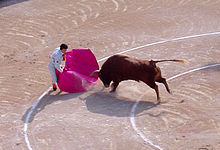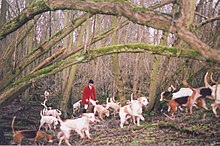Animals in sport
This article needs additional citations for verification. (January 2013) |

Animals in sport are a specific form of working animals. Many animals, at least in more commercial sports, are highly trained. Two of the most common animals in sport are horses and dogs.
Types of animal sporting events
There are many types of animal sporting events, with varying levels of participation from humans. Some are solely between the animals while others use the animals in a lesser role. Most sports involve training, while some can also involve selective breeding.
There are some large-scale events that include animals in a variety of sports. A rodeo can comprise many different sports, ranging from bull riding to pole bending. Some of the most well known types of animal racing are horse racing, dog racing (e.g. Greyhound racing, sled dog racing), pigeon racing, and camel racing.

Racing
Racing is the most popular form of animal-related sport, particularly
One-on-one and team events
There are some non-racing competitive events involving animals. Polo is an example, with competitors hitting a ball with mallets while on horseback. Elephant polo dates back to the early 20th century when members of the British aristocracy in Nepal began playing the sport.[2]
In the 14th to 16th centuries jousting was a popular one-on-one tournament event involving knights on horseback.[3]
Fighting

In most countries, the act of causing two or more animals to fight each other, as in
There are several other
Animals that take part in animal fights are usually specifically bred for strength and stamina.
Killing

Hunting began as a crucial component of
Dangerous hunting, as for lions or wild boars, usually on horseback (or from a chariot, as in Pharaonic Egypt and Mesopotamia) also had function similar to tournaments and manly sports: an honourable, somewhat competitive pastime to help the aristocracy practice skills of war in times of peace. In ancient Rome the "Venatio" was a form of entertainment that pitted humans against animals in an amphitheater.
In modern times, hunting is usually legal as long as the hunter has a license, though there are some unregulated forms in some countries. Animals can be on either side of a hunt, assisting the hunters or being hunted themselves.
Fishing
Pigeon shooting
Shows of training or breeding

Shows are intended to highlight the excellence of training or breeding of the animals involved. There is a variety of horse riding sports in this category, including show jumping and dressage, both of which are featured at the Olympic Games. At lower levels, horse shows offer a wide variety of competition both riding and driving as well as In-hand classes that evaluate equine conformation.
Dogs, being easily
Some unusual animals also take part in shows, such as the competitors in
Popular culture
Films and television series about animals in sport can be realistic or fictional, involving animals in an activity that they cannot really perform. Seabiscuit is a fairly accurate portrayal[according to whom?] of the famous American horse of the same name, while MVP: Most Valuable Primate, a film about a hockey-playing chimpanzee, is unrealistic.[citation needed]
The 1980
From 1976 to 1999, the BBC broadcast One Man and His Dog, a television series about sheepdog trials.[12] They also commissioned three series of Pets Win Prizes, a game show with contestants' pets having to perform in various tasks.[13][14]
Man vs. Beast is an American television show that pitches humans against animals in a variety of unusual challenges,[15][16] including competitive eating between world champion Takeru Kobayashi and a brown bear.[17]
See also
- Cruelty to animals
- Animals in culture
- Animals in professional wrestling
- Animals on television
- Insect fighting
References
- ISBN 9788183240260.)
{{cite book}}:|first=has generic name (help)CS1 maint: multiple names: authors list (link - ^ "Bushell at elephant polo World Cup". BBC News. 5 December 2008. Retrieved 27 April 2009.
A team from England have become the new world champions of elephant polo. Air Tuskers beat Scotland's Chivas, on Friday in Southern Nepal.
- ISBN 978-0-85115-470-1.
- ^ Ramakrishnan, T. "Governor clears ordinance on 'jallikattu'". The Hindu. Retrieved 2017-02-26.
- ^ HK feds bust illegal
- ^ "The morality of hunting with dogs" (PDF). Campaign to Protect Hunted Animals. Retrieved 13 October 2007.[permanent dead link]
- ^ Carmichael, Emma (July 27, 2012). "Gawker's Guide to the Olympic Sports You're Pretty Sure Don't Exist: Shooting". Gawker. Archived from the original on May 6, 2013.
- ISBN 978-0-7864-4064-1.
- ^ Ant, C. (August 15, 2016). "Animalympics: The Forgotten Animated Movie About Animals in the Olympics". Laser Time Podcast. Retrieved 10 December 2019.
- ^ Canby, Vincent (November 12, 1971). "Angela Lansbury in 'Bedknobs and Broomsticks'". The New York Times. p. 54. Archived from the original on July 18, 2018. Retrieved July 17, 2018.
- ^ "Budweiser's Super Bowl ad shows new Clydesdale foal". KVOA.com. Archived from the original on January 4, 2015. Retrieved 9 March 2017.
- ^ "The game's over for One Man and His Dog". BBC News. 17 February 1999. Retrieved 8 May 2014.
- ^ Wallace, Richard (17 March 1995). "Danny Baker axed from his TV show". Daily Mirror.
- ^ Rampton, James (23 June 1995). "Animal magic - Dale Winton , the cult TV quizmaster in the fine tradition of British campery, is suddenly very popular. Now everyone wants him to front their kitsch comedy format. James Rampton dodges the innuendoes". The Independent.
- Slate.com. Retrieved 2006-06-15.
- ^ "Unnatural Animal Acts A Turnoff". Born Free Foundation. Retrieved 2006-06-15.
- ^ Larry Getlen (19 May 2005). "The Miracle That Is Kobayashi". The Black Table. Archived from the original on 19 February 2008. Retrieved 23 February 2008.
